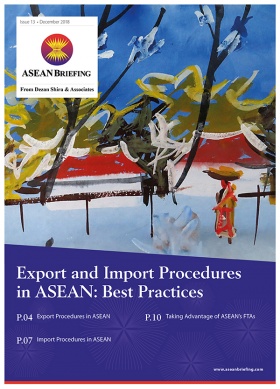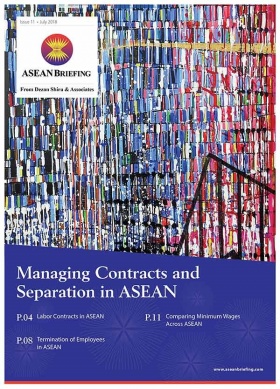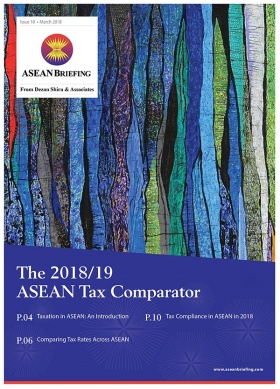Malaysia’s 2020 Budget Courts Investment from MNCs, China
- Malaysia’s 2020 budget provides incentives to attract multinational companies.
- The country will establish a special channel to specifically cater to Chinese investors.
- There are also incentives to digitize more local businesses and develop the digital economy.
On October 11, 2019, Malaysia unveiled its 2020 budget, which focused on providing tax incentives and grants to woo more foreign investments, in particular from China, develop the digital economy, and improve infrastructure.
The government announced a budget for 2020 of 297 billion Ringgits (US$70 billion) – smaller compared to the 314 billion Ringgits (US$74 billion) allocated in 2019 – as it predicts a budget deficit of 3.2 percent for 2020, wider than the initial target of 3 percent.
Courting major multinationals
The government will make available up to 1 billion Ringgits (US$238 million) worth of incentives over five years for multinational companies.
These incentives are primarily aimed at attracting Fortune 500 companies and global companies engaging in high-end technology, manufacturing, or value-added industries. To qualify, companies will need to invest at least 5 billion Ringgits (US$1.1 billion) into the country. The government hopes this investment will create 150,000 jobs over the next five years.
Domestic businesses seeking to become export-orientated are eligible for up to 1 billion Ringgits worth of incentives over five years. A 500 million Ringgit (US$119 million) in loans has also been given to women entrepreneurs.
Increasing Chinese investments
The government is set to establish a ‘special channel’ to specifically cater to Chinese investors. The special channel will be managed under InvestKL, a government investment promotion agency.
A report by Nomura Holdings, a Japanese financial holding company, stated that Malaysia was already the fourth biggest beneficiary of the trade war, gaining some 1.3 percent in GDP from trade diversions since 2018. In the first half of 2019, Chinese investments totaled 4.8 billion Ringgits (US$1.1 billion), second to only the US with 11.7 billion Ringgits (US$2.7 billion).Regulations that detail how the special channel will operate are forthcoming.
Developing the digital economy
Investors in the electronics and electrical (E&E) industry, especially those investing in selected knowledge-based services, are eligible for a 10-year tax exemption.
Investors will also be entitled to an ‘investment tax allowance’ if they have already exhausted the ‘reinvestment allowance’, to reinvest in the country. Moreover, the budget will distribute a 50 million Ringgit grant (US$ 11 million) under the 5G Ecosystem Development Grant to accelerate the digital economy.
The country’s electronics industry is a significant contributor to the national economy, with exports in 2018 valued at 119 billion Ringgits (US$28 billion) – 38 percent of total exports.
The government hopes the incentives will encourage investors to further advance the industry through the introduction of new technology, re-training of the local workforce, and the development of new E&E subsectors.
While the type of knowledge-based services eligible for the tax exemptions has not yet been detailed, implementation measures are forthcoming.
Grants for automation
To encourage businesses to implement automation in their business processes, the government will provide the following incentives:
- Accelerated capital allowance and automation capital allowance on the first 2 million Ringgits (US$476 thousand) and 4 million Ringgits (US$953 thousand) on qualifying capital expenditure. This will be extended to the year 2023 for companies in the manufacturing sector; and
- The incentive is extended to companies in the services sector on the first 2 million Ringgit (US$476 thousand) on qualifying capital expenditure from 2020-2023.
The government will also allocate 550 million Ringgits (US$131 million) as grants to help companies in the manufacturing and services sector embrace automation.
Foreign ownership of property
The threshold on high rise properties (condominiums and apartments) for foreign ownership has been reduced from 1 million Ringgits (US$238 thousand) to 600,000 Ringgits (US$143 thousand).
The lowering of the threshold is aimed at reducing the supply overhang which amounted to 8.3 billion Ringgits (US$1.9 billion). It is worth noting that local buyers will be given priority to buy these units, and if there are no interests from local buyers, the unit will be open for foreigners to purchase.Infrastructure development
The budget has allotted 12.2 billion Ringgits (US$2.9 billion) for various infrastructure megaprojects in urban-rural areas.
These include the Pan Borneo Highway and the Kuala Lumpur mass rapid transit (MRT) project. Other projects include spending more than 500 million Ringgits (US$119 million) on electricity, 1 billion Ringgits (US$238 million) on rural roads, and more than 500 million (US$119 million) Ringgits on electrification projects.
An additional 1.6 billion Ringgits (US$381 million) will go towards building new hospitals and renovating existing ones.
Natural Resources
Some 550 million Ringgits (US$131 million) have been set aside as soft loans for palm oil replanting. The 12-year loan, primarily for smallholder farmers, will only need to be repaid after the fourth year.
Furthermore, the government will accelerate the implementation to raise its biofuel mandate in the transportation sector to B20, from its current level of B10. The government expects this to increase palm oil demand by as much as 500 thousand tons per year.
Increasing competition in ASEAN
As oil-related revenues have declined, dampening economic growth, the country is eager to find new sources of state revenue, especially from companies looking to diversify their supply chains as a result of the ongoing US-China trade war.
The incentives provided by the 2020 budget also come as other ASEAN members scramble to take advantage of the spillover of the trade war. Indonesia, Vietnam, Thailand, and the Philippines have all issued various incentives and tax cuts to attract foreign investments.
About Us
ASEAN Briefing is produced by Dezan Shira & Associates. The firm assists foreign investors throughout Asia and maintains offices throughout ASEAN, including in Singapore, Hanoi, Ho Chi Minh City and Jakarta. Please contact us at asia@dezshira.com or visit our website at www.dezshira.com.







